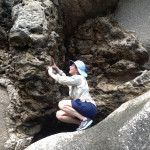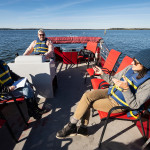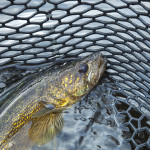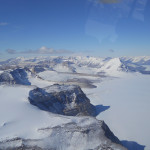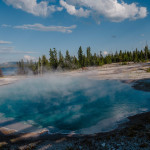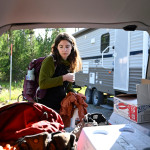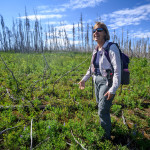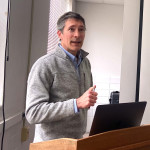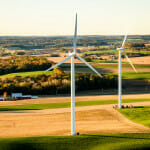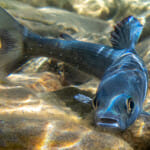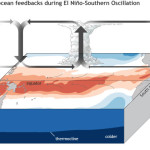Tag Climate change
Fossil corals point to possibly steeper sea level rise under a warming world
Newly uncovered evidence from fossil corals found on an island chain in the Indian Ocean suggests that sea levels could rise even more steeply in our warming world than previously thought.
An up-close look at climate coverage
Great Lakes Climate Solutions reporter Isabelle “Izzy” Ross visited journalism classes, met with experts in clean energy and learned about Madison’s (and arguably the world’s) most studied lake, Lake Mendota.
Retreat of tropical glaciers foreshadows changing climate’s effect on global ice
This research points to a single likely conclusion: The world's tropical glaciers, more than 99% of which are located in the Andes, are the first to shrink beyond what's been seen in the recent geologic past.
Walleye struggle with changes to timing of spring thaw
Newly-hatched walleye are hungry fish, dependent on meals of tiny zooplankton during the spring. As Midwestern lakes thaw unusually early or late, these prized fish can miss the dinner bell.
Multitasking microbes: UW–Madison scientists engineer bacteria to make two valuable products from plant fiber
UW researchers have engineered bacteria that can produce two chemical products at the same time from underutilized plant fiber. The discovery could help make biofuels more sustainable and commercially viable.
Antarctica’s ancient ice sheets foreshadow dynamic changes in Earth’s future
Identifying how and why Antarctica's major ice sheets behaved the way they did in the early Miocene could help inform understanding of the sheets' behavior under a warming climate.
Two new UW–Madison-led studies inform outlook on scaling of carbon removal technologies
The research makes it clear that ensuring the sustained well-being of our planet requires a more serious commitment toward new carbon dioxide removal technologies and a faster scale-up of their production.
Tomorrow’s Yellowstone
The landscapes of Yellowstone and Grand Teton national parks are loved by people around the world, but human-driven changes to climate will make for warmer, drier conditions with more fires. Monica Turner and her lab have been studying the changes in this ecosystem for decades and they want to make sure they communicate what they’re finding with the public.
Tomorrow’s Yellowstone: Arielle
As a PhD student in Turner’s lab, Arielle Link helps with the long-term forest resilience projects the lab has been conducting since the 1988 fires. But she's also working on her own PhD work investigate how lodgepole pine forests recover after severe wildfire by studying the fungi that grow in the understory and on the roots of the trees.
Tomorrow’s Yellowstone: Researchers
Getting to work, eat, live and sleep in Yellowstone and Grand Teton National Park everyday is a unique experience and one Arielle, Timon and Lucy don’t take for granted. But with such important work and busy field days, it’s also important for the researchers to care for themselves.
Tomorrow’s Yellowstone: Monica
Rooted in a deep love of the Greater Yellowstone Ecosystem, Monica Turner has spent the last 35 years training a generation of fire ecologists, influencing forest management and shaping our understanding of the future of western landscapes. While she feels the urgency to find answers and take action towards solutions that help limit human-driven climate change, she also feels optimistic.
Tomorrow’s Yellowstone: Lucy
Driven by her passion for the Greater Yellowstone Ecosystem and endless curiosity, recent UW–Madison grad and lab manager Lucy McGuire helps everyone stay organized and conduct their projects smoothly in the field. Whether they need an extra hand, a morale boost or a debrief on the discoveries of the day, Lucy is there.
Tomorrow’s Yellowstone: Timon
It can be difficult to connect the urgency and magnitude of climate change with every day life, but by starting with explaining the changes that are happening in these beloved national parks, PhD student Timon Keller hopes to inspire people to reflect on what a changing climate would mean for their own communities.
Meet Wisconsin’s new state climatologist, Steve Vavrus
Vavrus is an expert on global climate change, extreme weather and Wisconsin climate.
UW experts provide tips for dealing with dangerous heat
UW experts weigh in on why heat can be so dangerous for our health and offer tips on how to stay cool when temperatures soar.
Art that integrates data visualizations can help bridge the US political divide over climate change
Researchers have shown that combining climate data with visually engrossing art can make data more meaningful to viewers and bridge political divides related to climate science.
Atmospheric rivers linked to melting Greenland ice sheet
New research from UW–Madison's Space Science and Engineering Center shows the melting effects of atmospheric rivers on the ice sheet, which contains enough water to raise sea levels by 7 meters, or 23 feet.
Corporate investment could improve climate-tech innovation
When well-resourced corporations invest in start-ups, they can have an outsized influence on which start-ups succeed and grow, therefore shaping climate technology trajectories.
Earth’s orbit is more important in driving tropical Pacific climate than previously thought
Researchers found that the atmosphere and ocean pushing on each other is important in creating the climate on the tropical Pacific.

